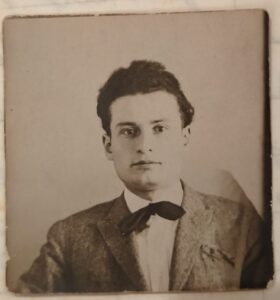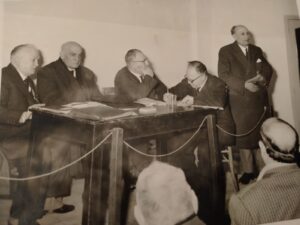The Elegant Subversive – The Antifascist Life of Giacomo Schirone

The story concerns a family figure: Giacomo Schirone, one of the two brothers of my paternal grandfather, thus uncle of my father, who was named after him. Born in 1900 (but documents give the date as January 21, 1901), he was always a socialist; persecuted by fascism, exiled to France, a fighter in Spain, an anti-fascist after the war and until the end. As a philosophy of life, he was anticlerical and rationalist.
It was not easy to put back in place all the pieces of a life fully lived in an active and participatory way in national and international events, from his youthful years to the end. So many archival details, personal notes, manuscripts, and traces of his rich political and cultural activity that, together, restore body and voice to Giacomo, a dignified figure of a fine and accurate tailor from Bari. A lifelong internationalist by ideals, a companion of Nenni, a fighter in Spain (the only Bari native – documented – to have participated in the Civil War), a reference point for young people in Bari, Milan, Marseille.
Cultivator of elegance even as a partisan.
It is a research that wants to go beyond the exposition of an affective biography to become a collective memory and shed light on a personal and densely intertwined affair with the History of the Twentieth Century. An example of a life, consistent and adventurous.

Despite his low level of schooling, James cultivated an intellectual curiosity first toward socialist thought, to political choices that repeatedly endangered his life and the safety of those around him. Hence the decision to leave (it was the night of mid-August 1923) clandestinely, to France. From Marseille then his militancy led him to the choice of fighter in Spain, in Carlo Rosselli’s International Brigades, alongside Nenni and Di Vittorio.
He joined the birth of the Action Party; always in the forefront, we find him both at the 1st Congress of the National Liberation Committees and in the reconstitution of the Chamber of Labor (both held in Bari in January 1944).
He is present in the tragic July 28, ’43 procession in Bari (massacre of Via Niccolo dell’Arca); a Freemason by affinity with the rational and brotherhood thought; anticlerical to the end: through Giacomo we also learn about the life of the exiles, as well as the thought of a great Spanish rationalist, Francisco Ferrer, whom Giacomo would later popularize in postwar Bari cultural life.
His story, political and human, is also recounted through the words of those who knew him, including journalists who passionately profiled him in the aftermath of his death (Sept. 16, 1980).
